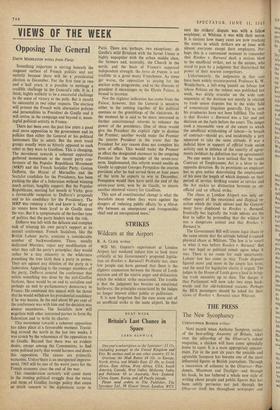STRIKES Wildcats at the Airport
R. A. CLINE writes: Will Mr. Gunter's experiences at London Airport last weekend induce him to look more critically at his Government's proposed legisla- tion on Rookes v. Barnard? Probably nut, since few people can have guessed that there is the slightest connection between the House of Lords decision and all the tourist anger and dislocation which the wildcat strike occasioned. The trouble is that the judgment has become an emotional battle-cry; the principles enunciated by the judges no longer interest either public or politicians.
It is now forgotten that the case arose out of an unofficial strike at the same airport. In that
case the strikers' dispute was with a fellow employee; at Whitsun it was with their union. It is curious how many cases are now reaching the courts in which strikers are at issue with almost everyone except their employers. Per- haps this is a convenient moment to remember that Rookes v. Barnard dealt a serious blow to the unotlicial striker, not to the unions, who stood to gain by a judgment that diminished the power of their nearest competitors.
Unfortunately, the judgments in that case have been widely misinterpreted. Professor K. W. Wedderburn, a left-wing pundit on labour law whose Pelican on the subject was published last week. was direly oracular on the wide con- sequences of the decision not merely in relation to trade union disputes but in the wider field of commercial litigation generally. Up to noW his prophecies have not been fulfilled. The truth is Ihat Rooke.s v. Barnard was a fair and just decision on the facts before the court. The judges took a reasonable view of the extent to which the unofficial withholding of labour--in breach of contract---should go, and incidentally a jury appeared to take the same attitude. It was a judicial blow in support of official trade union activity and in defence of the sanctity of agree- ments (wildcats by definition tear up agreements).
No one seems to have noticed that the recent Contract of Employment Act is a blow in the opposite direction. By its provisions an employer has to give notice determining the employment of his men the length of which depends on their period of service. Striking counts as service and the Act makes no distinction between an un- official and an official strike.
The chaos at London Airport was only an- other aspect of the emotional and illogical re- action which the trade unions and the Govern- ment have displayed to Rookes v. Barnard. Ironically but logically the trade unions are the first to suffer by pretending that the wildcat is not a dangerous animal and that Rookes V. Barnard is.
The Government Bill will create legal chaos to the same extent that the attitude behind it caused physical chaos at Whitsun. 'The law is to revert to what it was before Rookes v. Barnard.' But no two legal or political minds agree what it was. There is no room for such uncertainty. Labour law has come to stay. Trade disputes figured more and more in the courts last term; and the need for legislative clarity is urgent. The judges in the House of Lords gave a lead in bring- ing trade unionists up to date. The danger is that Parliament will now take two steps back- wards and for old-fashioned reasons. Perhaps the BEA passengers should be asked for their views of Rookes v. Barnard since Whitsun.


































 Previous page
Previous page